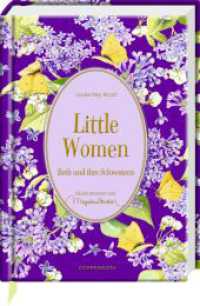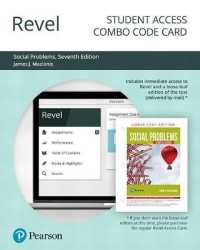Full Description
The immense benefits of herbal medicines are rapidly being discovered today through modern
research as globalization has made more and more herbs available worldwide. Research on
biomolecular effects of herbs and their antioxidant activity has gained great momentum due to the
apparent links between oxidative stress, ageing, and disease. This new book is a consolidation of
the latest cutting-edge research on herbal medicines and their benefits, challenges, and potential
as well as consumption patterns and business and marketing opportunities.
The book takes a look at the challenges and attitudes of consumers and administrators toward
herbal supplements and also covers marketing and supply chain issues and outlines the economic
and business opportunities for herbal supplements in various locales and nations. The volume
goes on to explore interactions, dosing, and analysis, providing information on clinical trials for
nutritional and herbal supplements as well as risks, toxicity, and safety concerns with regard to
herbal medicines. Food safety standards and regulations for herbal supplements are also
addressed. The final section emphasizes using herbal supplements for a range of health
conditions, such as how the immune-boosting qualities of herbal supplements can be used to treat
conditions such as low libido, boils, fever, diabetes, blood pressure, osteoporosis, herpes,
insomnia, Alzheimer's disease, and more.
Contents
PART I: INTRODUCTION, CHALLENGES, AND ATTITUDES OF CONSUMERS AND ADMINISTRATORS. 1. Current Status and Significant Challenges for the Use of Herbal Supplements. 2. Significant Challenges for Use of Herbal Supplements. 3. Clinical Trials for Herbal Nutritional Supplements. 4. Survey and Statistical Analysis for the Consumption Scenario of Nutritional Supplements. 5. The Role and Trends in Nutritional Supplement and Herbal Product Consumption. 6. Understanding Attitudes of Consumers Toward Herbal Products. 7. Need for Improvement and Administrative Attitude Toward Herbal Supplements. PART II: MARKETING AND SUPPLY CHAIN. 8. Business Opportunities for Herbal Supplements. 9. Business Opportunities for Herbal Medicines. 10. Marketing/Supply Chain for Herbal Supplements: Attributes and Challenges. PART III: INTERACTIONS, DOSING, AND ANALYSIS. 11. Herbal Supplements: Risks, Benefits, and Potential Interactions. 12. Potential for Inconsistency of Herbal Dosing. 13. Recent Advancements in the Analysis of Herbal Supplements. PART IV: REGULATIONS, TOXICITY, SAFETY STANDARDS, AND QUALITY. 14. Administrative Regulations for Herbal Supplements. 15. Toxicological Effects of Adulterated Herbal Supplements. 16. Safety of Herbal Supplements: An Overview of Pharmacovigilance Approaches and Challenges. 17. Quality and Standard Assurance of Herbal Supplements. PART V: TREATMENT OF MEDICAL CONDITIONS AND DISEASES. 18. Common Herbal Supplements for the Treatment of Selected Diseases. 19. Common Herbal Supplements: Potential Interactions and Treatment of Diseases. 20. Flaxseed-Based Herbal Supplements for Chronic Medical Conditions. 21. The Potential of Parsley: Composition, Biological Properties, and Health Benefits. 22. Utilization of Traditional Medicine for Respiratory Disorders in Northeast India. 23. Plant-Based Remedies for Alzheimer's Disease. 24. Treatment of Osteoporosis with Herbal Supplements. 25. Impact of Plant-Based Phytochemicals on Glycemic Control and Insulin Sensitivity in Diabetes.








